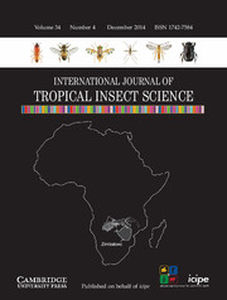Worldwide, food grain is lost due to damage by insects, mites and micro-organisms. Any additional approaches towards preventing farm-storage losses could contribute to saving more grain. In one paper of this issue, the authors assess the effect of a lectin-like protein on lepidopteran larvae causing loss in stored food. Another study presents research on the effects of sublethal concentrations of two insect growth regulators on Aedes aegypti fitness parameters. Bamboo traps placed in a cloud forest are good tools to determine the macroinvertebrate communities living in the forest. These are just three of the eight interesting studies presented in this issue.
Our journal is keeping up to date with technological changes. Hence, from now on, contributors to the International Journal of Tropical Insect Science can submit their manuscript files online using the journal homepage-based MS submission system, which has recently been set up. Authors should supply a MS Word or Rich Text Format document for the text, and low-resolution JPEG or PDF images for the figure files. Should your article be accepted, we shall require higher resolution image files. Manuscripts can be submitted at the Journal's website at Cambridge University Press (www.journals.cambridge.org/jti) and your uploaded files will automatically be forwarded to the IJT Secretariat ([email protected]).
I would like to thank our co-publisher, editorial advisory board and valued reviewers for making the Journal what it is today. Additionally, I thank the contributors who continue to submit their manuscripts to the Journal. The whole IJT team will continue to strive to produce the Journal in an efficient and timely manner in 2009. Unfortunately, for this edition, we have been late by 1 month, for which I would like to apologize.


